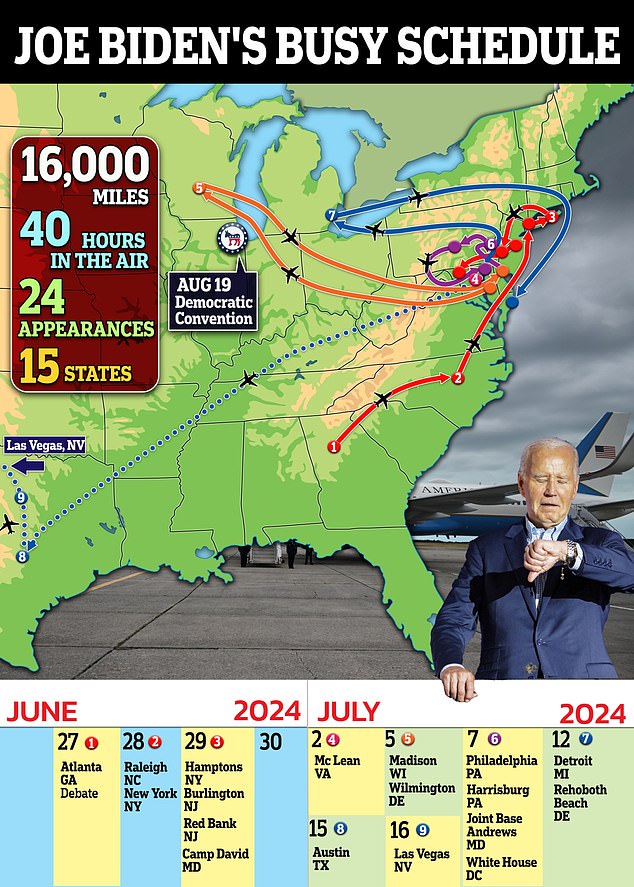Hillary Clinton has described the presidential campaign as so brutal on the mind and body that “you’d have to be crazy” to continue it.
Joe Biden, 81, has four months to convince Americans to vote for him instead of Donald Trump, and doctors fear the effect this will have on the ailing president’s health.
Between last month’s disastrous debate (which prompted calls for Biden to resign) and election night on Nov. 5, Biden will have traveled more than 15,000 miles — a very conservative estimate based on his known schedule and comments from his team.
He will also have held more than 100 public and private events, and his staff has said the president will continue to pursue an “aggressive” travel schedule, making no mention of his revenge debate against Trump on Sept. 10.
But doctors told DailyMail.com that stress, jet lag and sleep and dietary disorders could exacerbate any neurological or physical problems the president has.
Dr Raj Dasgupta, chief medical advisor at Fortune Recommends Health, told this website: ‘When it comes to travel, as we age, our body’s ability to adapt and recover naturally begins to decline.
‘A hectic schedule of travel and events can have significant adverse effects on an older person’s health.
‘The stress of such a demanding schedule increases the risk of heart problems such as high blood pressure, hypertension, heart attacks or strokes.
“Lack of free time and self-care can make existing health problems worse.”
Other health risks that arise from a disjointed schedule include dehydration, poor diet and nutrition, and a weakened immune system.
Dr Kevin Huffman, founder of Ambari Nutrition, told DailyMail.com that regular stress while travelling can also lead to increased blood pressure and increased risk of blood clots, which can increase the risk of stroke.
He said jet lag caused by multiple daily flights combined with a demanding schedule of public appearances can induce anxiety and confusion.
Dr. Huffman added: “Anxiety and confusion induced by disorienting environments and excessive demands are especially dangerous in older patients with subtle cognitive slowing, who can quickly become overwhelmed by unfamiliar routines.”
The president already struggles with several pre-existing health issues, including sleep apnea, acid reflux, irregular heartbeat, high cholesterol, allergies, arthritis and nerve damage in his feet.

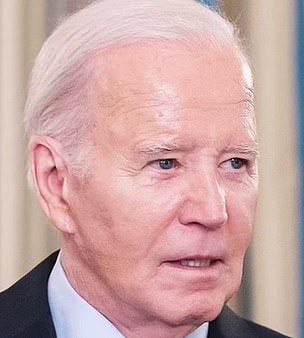
Biden at a Democratic candidates debate in 2019 looking dapper (left) and the sick president in 2024
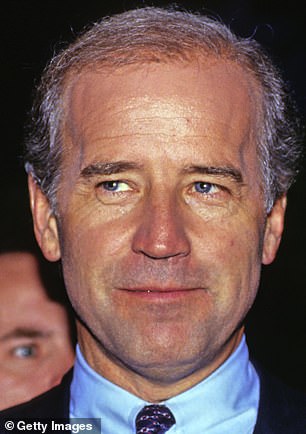
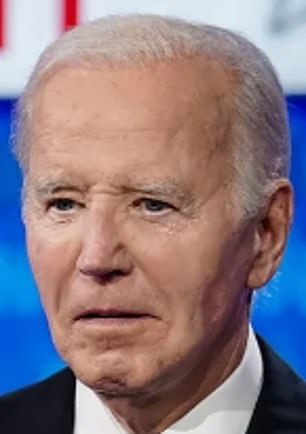
Biden looking dapper in 1991 (left) compared to last month’s debate against Donald Trump (right)
In the 10 days after Biden’s dispiriting debate with former President Donald Trump, 77, Biden waged an unprecedented, massive campaign in an attempt to calm fears about his age and mental acuity.
After months of limited interviews and scaled-back appearances, he visited nine states and attended multiple campaign events.
But several gaffes and moments of confusion — including a claim that she was the first Black woman to be president — have done little to convince people that Biden is up for a campaign challenge.
Despite the concerns, White House staff insist the president is up to the challenge.
Press secretary Karine Jean-Pierre assured reporters Monday that Biden is healthy, stressing that a Parkinson’s expert who has visited the White House on numerous occasions was not there to evaluate the president.
And White House National Security Council spokesman John Kirby defended the president after his debate performance, telling reporters he had never questioned his sanity or executive duties.
Over the next two weeks, Biden will travel to events in Michigan, Texas and Nevada.
In total, in the three weeks following his failed debate, the president will have traveled to 13 states and traveled at least 7,400 miles.
He will have attended and spoken at 23 different events and spent around 20 hours traveling.
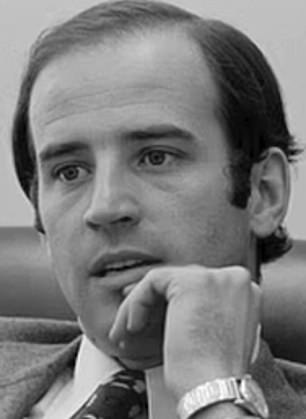
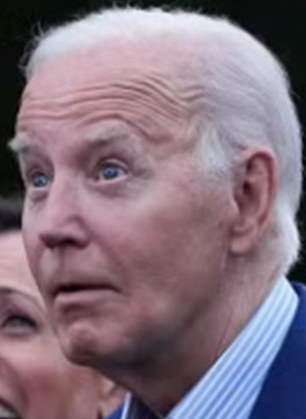
Biden at his peak (left) and a video of the president staring into space on the White House lawn in June that raised concerns.
Biden’s campaign schedule beyond July 17 has not yet been confirmed, but his campaign has said the president intends to travel to all key states before polls open in November.
These states include: Arizona, Georgia, Michigan, Nevada, North Carolina, Pennsylvania, and Wisconsin.
DailyMail.com calculated the estimated miles Biden would fly if he traveled from the White House to the capitals of each key state, totaling about 7,380 more miles and 20 more hours on Air Force One.
He will also fly about 600 miles from DC to Chicago for the Democratic National Convention taking place August 19-22.
Biden will also have to prepare and travel for his second debate with Trump on Sept. 10. The location has not been announced.
The campaign has said it plans to adopt an “aggressive” travel schedule and unscheduled events and interviews, which could mean packing even more events into the calendar amid its already extensive travel plans.
This conservative estimate means that by Election Day, Biden will have spent at least 40 hours flying at least 15,000 miles since participating in the June debate.
Family medicine physician Dr. Laura Purdy told DailyMail.com that Biden’s campaign could overwhelm him, increase his mental load and cause him stress.
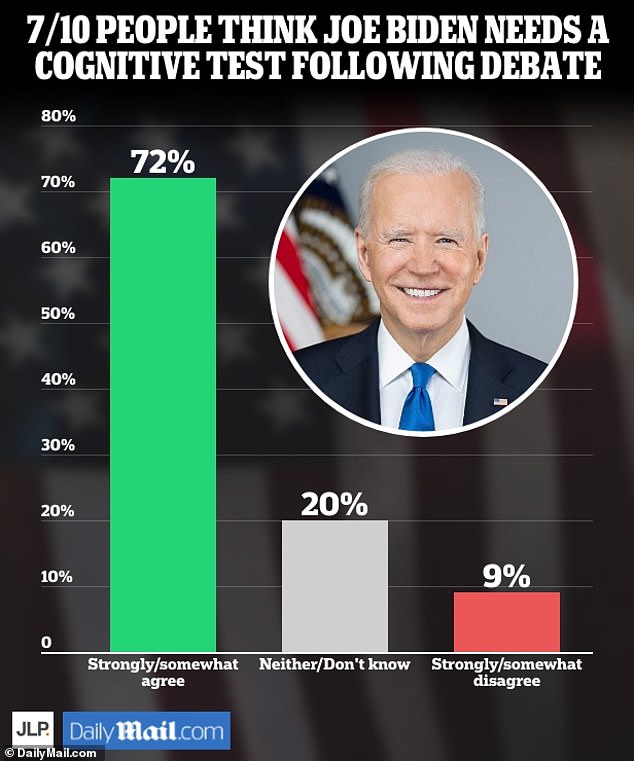
More than 70 percent of likely voters believe President Joe Biden should take a cognitive test, according to an exclusive DailyMail.com poll conducted after the debate
Dr Dasgupta told DailyMail.com: “Overall, such a schedule can be very hard on an older person’s health and requires careful management. Not to mention that all the circadian rhythm disruptions and stress can also add up and lead to fatigue while travelling, which can leave one feeling groggy, irritable and exhausted.”
In the past two months, Biden has attended 89 events, including 54 in May and 32 in June, according to a log of his campaign activities kept by The New York Times.
He has held two rallies since May 1, attended 16 fundraisers and made seven speeches.
Additionally, Biden has had 13 interviews in the past two months.
While Biden’s agenda appears packed, it is historically light compared to previous presidents.
Compared to the three incumbent presidents who ran for reelection before him, Biden traveled to the second-fewest campaign events in the first half of the election year: 90.
In 2004, former President George W. Bush, then 57, traveled to 102 events, and in 2012, former President Barack Obama, then 42, traveled to 120 events between January and June of the election year, according to a review of Axios.
Biden’s light schedule adds to growing concerns that he is not up to the job, and his frequent and repeated episodes of freezing and lapses in memory and train of thought continue to worry voters and even prompt calls from Democratic lawmakers for Biden to drop out of the race.
In response to these calls, Biden redoubled his efforts, writing a letter to Democratic leaders stating that he would not resign. Instead, he insisted that his poor performance in the debate was due to a cold and lack of sleep.
From now on, the Biden campaign announced, the president will no longer hold events after 8 p.m. so he can get more rest.
Lack of sleep, especially in older age, can lead to spikes in blood pressure, heart strain, and impaired cognition and concentration. People may also feel confused, delirious, and emotional.
Lack of sleep can negatively affect certain areas of brain function, which can be especially problematic for older people who suffer from cognitive decline or dementia.
Doctors also told DailyMail.com that the hectic travel schedule could result in a compromised immune system, leading to Biden contracting a virus or bacteria.
It is often difficult to maintain proper nutrition and exercise when travelling from one city to another and experts told this website that this could lead to poor diet and weight gain, increasing the risk of obesity and diabetes.

